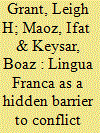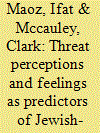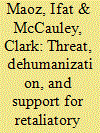|
|
|
Sort Order |
|
|
|
Items / Page
|
|
|
|
|
|
|
| Srl | Item |
| 1 |
ID:
102513


|
|
|
|
|
| Publication |
2011.
|
| Summary/Abstract |
In the past few decades, planned contact interventions between groups in conflict have played an important role in attempts at improving intergroup relations and achieving peace and reconciliation. This article focuses on such reconciliation-aimed intergroup encounters between Israeli Jews and Palestinians that seek to reduce hostility and increase understanding and cooperation between the two nationalities. Like other contact interventions conducted in settings of intergroup conflict, encounters between Israeli Jews and Palestinians represent a paradoxical project: this is a project that aspires to generate equality and cooperation between groups that are embedded in a protracted asymmetrical conflict. Though existing research teaches us valuable lessons on the effectiveness of contact conducted under optimal conditions, little is said about contact between groups involved in asymmetrical protracted dispute. The goal of this analysis is to examine the evolution of reconciliation-aimed contact interventions between Israeli Jews and Palestinians in the past 20 years. The research method is qualitative, relying on ethnographic data assembled during the relevant period of time. The findings identify and trace the evolution of four major models of Jewish-Palestinian planned encounters: the Coexistence Model, the Joint Projects Model, the Confrontational Model, and the Narrative-Story-Telling Model. The strengths and limitations of each model in transforming intergroup attitudes in asymmetric conflict are discussed.
|
|
|
|
|
|
|
|
|
|
|
|
|
|
|
|
| 2 |
ID:
121844


|
|
|
|
|
| Publication |
2013.
|
| Summary/Abstract |
This study presents a systematic transcript-based analysis of the dialogue occurring in a track two workshop attended by Jewish-Israelis and Palestinians. We hypothesized that participants from conflicting groups would form a shared superordinate identity in the course of the workshop. Our findings confirmed this hypothesis. Consistent with self-categorization theory, we demonstrate that the observed Jewish-Israelis and Palestinians mutually identified with the peacecamp, a collection of people and organizations that promote dialogue and conflict resolution efforts. In line with our expectations, and in contradiction to previous findings concerning communication between groups in conflict, participants demonstrated patterns of cooperative, counter-ethnocentric interaction. Through the paradigm of social identity theory, we explain these phenomena as the result of the participants' salient superordinate peacecamp identity. The study's findings offer an innovative theoretical contribution to the common ingroup identity model, showing that the reduction of intergroup bias can actually hinder the effectiveness of conflict resolution efforts. Specifically, by forming a superordinate identity, the observed participants are left less able to represents the needs, demands, and claims of their respective national groups and, hence, less able to produce ideas acceptable to their respective publics. The study also offers a practical contribution to the field of track two diplomacy, empirically verifying Hebert Kelman's assertion that when facilitators allow participants to form a cohesive group, they risk damaging both the quality of the workshop's ideas and the participants' ability to influence their leaderships (Rouhana and Kelman 1994; Kelman 1999, 2002).
|
|
|
|
|
|
|
|
|
|
|
|
|
|
|
|
| 3 |
ID:
190761


|
|
|
|
|
| Summary/Abstract |
Longstanding intergroup conflict is one of the most perilous issues on the global stage, leading to violence, displacement, and loss of life. Finding strategies to bring parties to the negotiation table is therefore of utmost importance for conflict resolution. Here we address a common problem in intergroup conflict - the lack of a shared, native tongue - which is typically solved by using a lingua franca. Three experimental studies revealed that a peace-building proposal presented in a lingua franca is perceived as less favorable to one’s own side than a proposal presented in one’s native tongue. Specifically, our studies demonstrated that the use of a lingua franca elicits higher levels of hatred and lower levels of sympathy, thereby reducing the perceived favorability of the proposal. Broadly, these findings indicate that the seemingly innocuous choice of the language could have serious implications for conflict resolution as well as for international diplomacy.
|
|
|
|
|
|
|
|
|
|
|
|
|
|
|
|
| 4 |
ID:
151154


|
|
|
|
|
| Summary/Abstract |
Recognition is vital for conflict resolution. This study was designed to learn more about the factors underlying the willingness to recognize the pain and suffering of the opponent in the asymmetrical protracted conflict between Israelis and Palestinians. Data were collected through a public opinion survey conducted with a representative sample of Israeli-Jewish adults (N = 511). Perceptions of threat/distrust toward Palestinians and dehumanization of Palestinians each made a significant contribution to explaining Jewish-Israeli (un)willingness to recognize Palestinian pain and suffering (R2 = .36). Hawkishness made an added significant contribution to the overall explanatory power of the model (R2 = .38). Higher scores on the threat/distrust scale and the dehumanization scale, as well as higher hawkishness predicted decreased willingness to recognize Palestinian pain and suffering. The implications of our findings for understanding the role of recognition and of moral concern in conflict resolution are discussed.
|
|
|
|
|
|
|
|
|
|
|
|
|
|
|
|
| 5 |
ID:
090138


|
|
|
|
|
| Publication |
2009.
|
| Summary/Abstract |
A representative sample of Israeli Jews (N = 504) completed a survey assessing attitudes towards compromise in the Israeli-Palestinian conflict. Support for compromise was well predicted (R = .63) by a combination of four scales: perception of collective threat from Palestinians, perception of zero-sum relations between Palestinians and Israelis, personal fear of Palestinians, and sympathy towards Palestinians. Feelings of hostility towards Palestinians did not make an independent contribution to this prediction. As hypothesized, respondents who perceived high collective threat and zero-sum relations were much less supportive of making concessions to Palestinians. However, respondents who indicated feeling personal fear were in regression analysis slightly more supportive of compromise. Sympathy toward Palestinians was associated with more support for compromise. Additionally, religiosity was strongly associated with decreased support for compromise. However, entering threat perceptions and sympathy into the equation substantially reduced the predictive value of religiosity, indicating that psychological mechanisms underlie, at least in part, the tendency of more religious respondents to show less support for making concessions to Palestinians.
|
|
|
|
|
|
|
|
|
|
|
|
|
|
|
|
| 6 |
ID:
080823


|
|
|
|
|
| Publication |
2008.
|
| Summary/Abstract |
Public opinion can permit or encourage retaliatory aggressive state policies against vulnerable but threatening out-groups. The authors present a model in which public support for such policies is determined by perceived threat from and dehumanization of the target group. This two-factor model predicts Israeli Jews' support for two retaliatory aggressive policies: the more hypothetical notion of Palestinian population transfer and concrete, coercive actions toward Palestinians. The authors find (1) that threat and dehumanization are distinct constructs, each having unique contributions to explaining support for aggressive retaliatory policies, (2) that threat and dehumanization significantly explain support for aggressive retaliatory policies when respondents' hawkishness, socioeconomic status (SES), and education level are taken into account, and (3) that the association of hawkishness and SES with support for aggressive retaliatory policies is largely mediated by threat perception. Results are highly consistent across two studies, suggesting the two-factor model may be useful for understanding support for aggressive action in situations of asymmetric conflict
|
|
|
|
|
|
|
|
|
|
|
|
|
|
|
|
| 7 |
ID:
091737


|
|
|
|
|
|
|
|